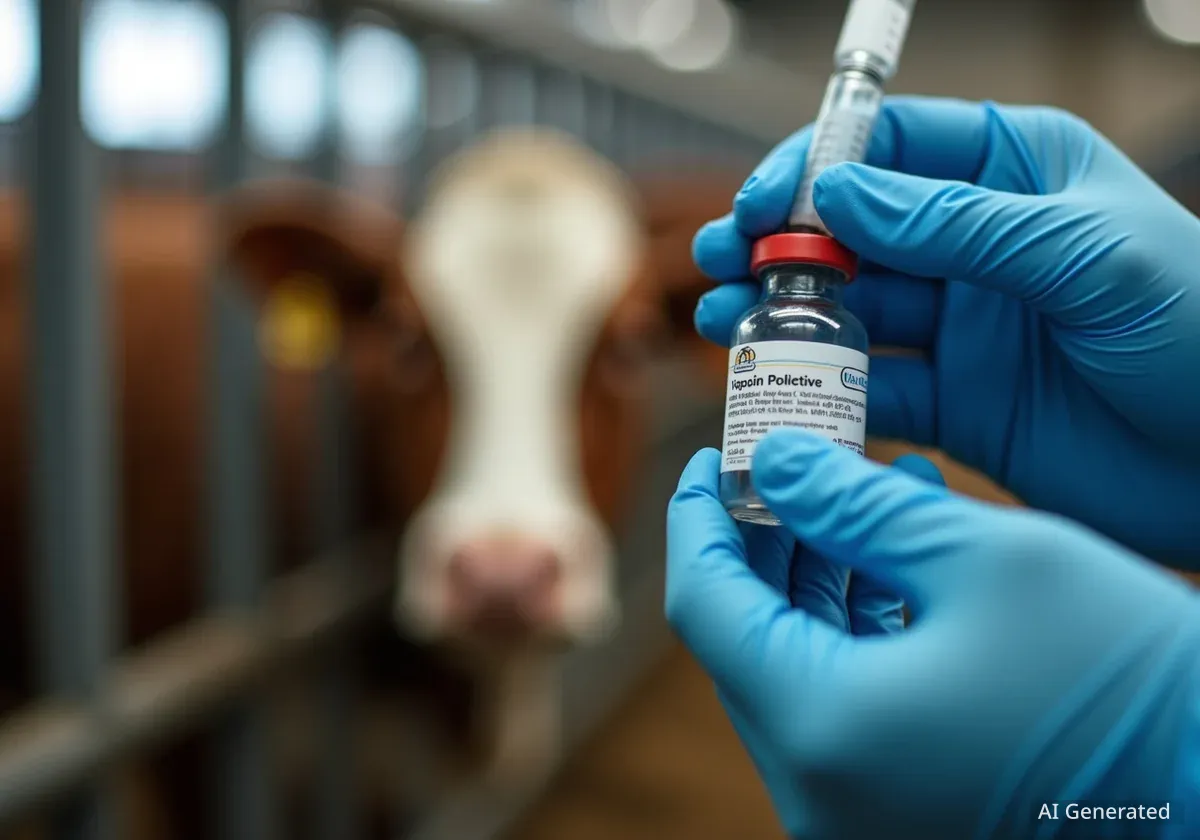The Canton of Bern is actively preparing for a potential outbreak of Foot and Mouth Disease (FMD). This highly contagious animal illness requires swift and coordinated action from various entities. Recent training exercises in the region have focused on improving the joint response of farmers, veterinary offices, civil protection units, and the army to manage such a crisis effectively.
Key Takeaways
- Bern Canton conducts drills for Foot and Mouth Disease.
- Collaboration between farmers, veterinarians, civil protection, and the army is crucial.
- FMD is a highly contagious viral disease affecting cloven-hoofed animals.
- Strict hygiene and rapid response are key to containment.
- The exercises aim to minimize economic impact and ensure animal welfare.
Understanding Foot and Mouth Disease
Foot and Mouth Disease (FMD) is a severe, highly contagious viral disease. It primarily affects cloven-hoofed animals, including cattle, pigs, sheep, goats, and deer. The disease causes significant economic losses due to reduced milk and meat production, trade restrictions, and the need for culling infected animals.
Symptoms include fever, blisters on the tongue and lips, inside the mouth, on the teats, and between the hooves. Animals often become lame and refuse to eat, leading to severe weight loss. While FMD rarely affects humans, it can spread rapidly among livestock populations, posing a serious threat to agriculture.
Fast Fact
Foot and Mouth Disease is considered one of the most economically devastating livestock diseases globally. Its rapid spread and severe impact on animal productivity can cripple agricultural industries in affected regions.
Bern's Preparedness Strategy
The Canton of Bern recognizes the potential threat of FMD. It has developed a comprehensive strategy to prepare for and respond to an outbreak. This strategy involves regular training exercises, clear communication protocols, and the establishment of robust emergency response teams.
These preparations are essential for protecting the canton's significant agricultural sector. Bern is home to numerous farms and livestock operations. An FMD outbreak would have severe consequences for these businesses and the wider regional economy.
"Effective collaboration is the cornerstone of our FMD response plan. We must ensure every stakeholder, from individual farmers to military personnel, understands their role and can act quickly and decisively," stated a spokesperson for the Bern Cantonal Veterinary Office.
Joint Training Exercises
Recent days have seen intensive training exercises across the Canton of Bern. These drills bring together diverse groups to practice their coordinated response. Participants include local farmers, veterinary staff, civil protection volunteers, and members of the Swiss Army.
The exercises simulate various scenarios, from initial detection of FMD to large-scale containment efforts. This practical training helps identify potential weaknesses in the response chain and allows for immediate adjustments. It also strengthens inter-agency communication.
Role of Veterinary Offices
Veterinary offices play a central role in FMD prevention and control. Their responsibilities include disease surveillance, rapid diagnosis, and implementing movement restrictions for animals. During an outbreak, they lead the culling of infected herds and oversee the disinfection of premises.
According to the Cantonal Veterinary Office, early detection is paramount. Veterinarians are trained to recognize FMD symptoms quickly and report suspected cases without delay. This allows for immediate isolation measures to prevent further spread.
Civil Protection and Army Involvement
Civil protection units provide essential logistical support during an FMD crisis. They assist with setting up roadblocks, managing traffic, and establishing temporary containment zones. Their personnel are also crucial for supporting sanitation efforts and assisting affected farms.
The Swiss Army's involvement brings additional resources, including manpower and specialized equipment. They can help with large-scale disinfection operations, transport of materials, and maintaining security in affected areas. Their structured approach is vital for managing complex emergencies.
Historical Context
Switzerland has a history of successful FMD containment. Past outbreaks, though rare, have highlighted the importance of a rapid, unified response. Lessons learned from these events continue to shape current preparedness strategies, emphasizing prevention and quick action.
Hygiene and Biosecurity Measures
Strict hygiene and biosecurity protocols are critical in preventing and controlling FMD. Farmers are regularly educated on best practices. These include controlling access to farms, disinfecting vehicles and equipment, and ensuring proper disposal of animal waste.
During an outbreak, cleaning and disinfection of stables and equipment become even more critical. The exercises ensure that all personnel involved understand and can implement these rigorous procedures correctly. This minimizes the risk of the virus surviving in the environment.
- Farm Entry Control: Limiting unauthorized access to livestock areas.
- Vehicle Disinfection: Cleaning and sanitizing all vehicles entering and leaving farms.
- Personal Hygiene: Ensuring farm workers and visitors follow strict hand and footwear disinfection protocols.
- Equipment Sanitization: Regular and thorough cleaning of all farm machinery and tools.
Economic Impact and Animal Welfare
An FMD outbreak has significant economic repercussions. It leads to direct losses from animal culling and indirect losses from trade bans and reduced consumer confidence. The canton's preparedness aims to mitigate these impacts as much as possible.
Beyond economic concerns, animal welfare is a key consideration. Rapid response and effective containment help reduce animal suffering. The training ensures that humane practices are followed during all stages of an FMD response.
The long-term goal is to protect the health of Bern's livestock and safeguard the livelihoods of its farmers. These regular drills are an investment in the canton's agricultural resilience.
Future Preparedness
The Canton of Bern will continue to conduct these vital exercises. Public health officials and agricultural experts regularly review and update response plans based on the latest scientific knowledge and international best practices. This ongoing commitment ensures that Bern remains ready to face any potential FMD threat.
Continuous education for farmers and the wider community is also part of the strategy. Raising awareness about FMD symptoms and prevention methods helps create a collective defense against the disease. Every individual plays a role in protecting the agricultural sector.




